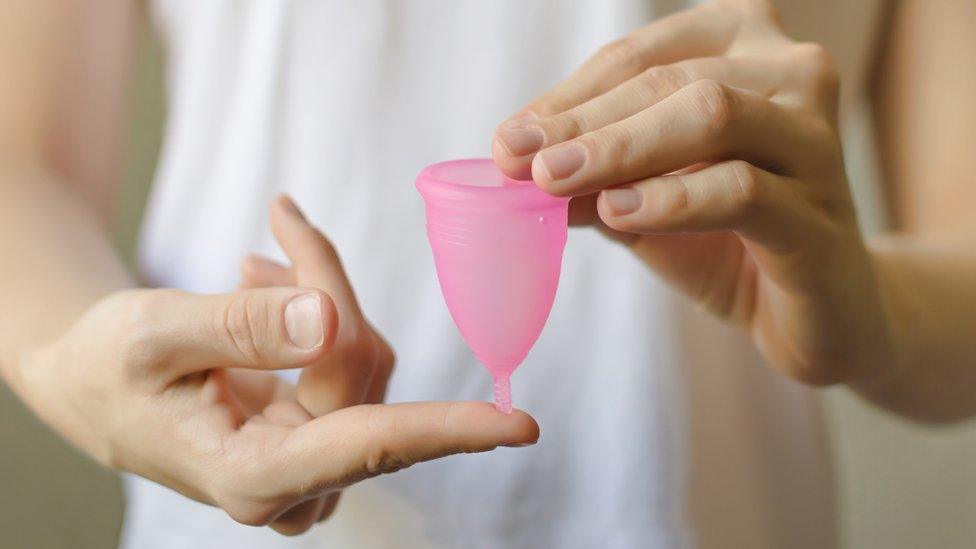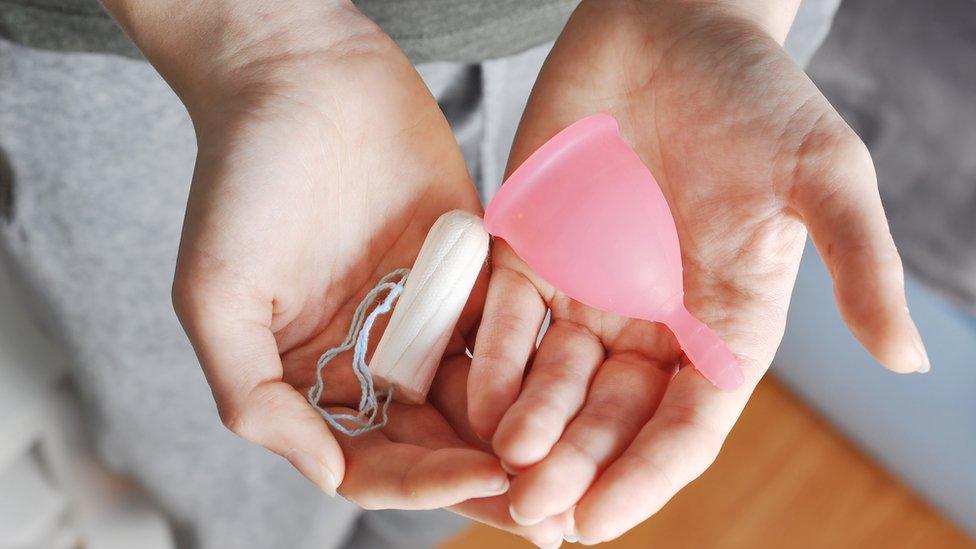Menstrual cup misuse 'can cause pelvic organ prolapse'
- Published

Incorrect use of menstrual cups could be resulting in some women suffering pelvic organ prolapse, the Victoria Derbyshire programme has been told.
The Chartered Society of Physiotherapy wants some manufacturers to include better safety advice.
Menstrual cups fit into the vagina and collect period blood. They are not currently regulated in the UK, and there is no safety testing.
The government said the NHS was improving pelvic health clinic access.

Jenny told the BBC she had believed she was "doing everything properly" in her use of the cup
Menstrual cups, which can last up to 10 years, have grown in popularity as a more sustainable alternative to single-use tampons and pads.
But there are claims that more education is needed before women decide to use them.
One woman, Jenny, told the BBC's Victoria Derbyshire programme she believed menstrual cups were responsible for her minor pelvic organ prolapse, after she had used them for three months.
"I was scared and I was worried," she said. "I didn't know what it might mean in the long term."

How to take out a menstrual cup safely
Kate Lough explains how to use a menstrual cup
Watch pelvic floor physiotherapist Kate Lough explain how to use a menstrual cup.

Pelvic organ prolapse occurs when the group of muscles and tissues that normally support the pelvic organs, called the pelvic floor, becomes weakened and cannot hold the organs in place firmly.
It causes one or more of the organs to drop down from the normal position and bulge into the vagina.
This can be the womb, bowel, bladder or top of the vagina.
Symptoms can usually be improved with pelvic floor exercises and lifestyle changes, but sometimes medical treatment is needed.
"There was no warning to say... this was a possible side-effect," Jenny explained.
"And I had really thoroughly read the instructions, so I thought I was doing everything properly."
Advice 'hard to understand'
The vast majority of women do not encounter any problems.
There is limited research on the products, but in a report by the Lancet Public Health journal, external last year - which looked at 43 studies involving 3,300 women and girls living in rich and poor countries - the authors concluded menstrual cups were a "safe option".
But the Chartered Society of Physiotherapy is calling for the cups - which are produced by a growing number of manufacturers worldwide - to be better regulated.
Currently they are not safety-tested, and there is no industry standard or body responsible for collating complaints.
Physiotherapist Kate Lough told the BBC: "Having looked at some of the information on some of the cups - particularly the information about taking the cup out -[it] is not correct and is hard to understand," she said.
"Using your pelvic floor muscles to bring the cup lower in the vagina is not correct."
She added: "Bearing down on the cup to push it within reach of your fingers is not good pelvic floor advice.
"It counters the advice women would be given to avoid prolapse."
'At first I was a convert'
Another woman, "Maria" - not her real name - started using the cups two months ago.
She has two children and had not previously had any prolapse-related issues.
"It was great at first [using the cups]... I was a convert," she said.
But then she encountered a problem.
She was referred by her GP to a gynaecologist, who, she said, told her she had experienced a minor vaginal prolapse "that probably happened because of the cup".
"She advised me not to use the cup any more," she added. "She was not a fan of them at all, especially in women who've already had kids like me."
The Department of Health pointed to NHS advice suggesting physiotherapy was "by far the most cost-effective intervention for preventing and treating mild to moderate prolapse".
It said the NHS Long Term Plan had committed to ensuring "that women have access to multidisciplinary pelvic health clinics and pathways across England via referral.
"Clinics can also provide training and support for local clinicians working with women," it added.

Follow the BBC's Victoria Derbyshire programme on Facebook, external and Twitter, external - and see more of our stories here.
- Published17 July 2019

- Published28 November 2019

- Published4 October 2018
